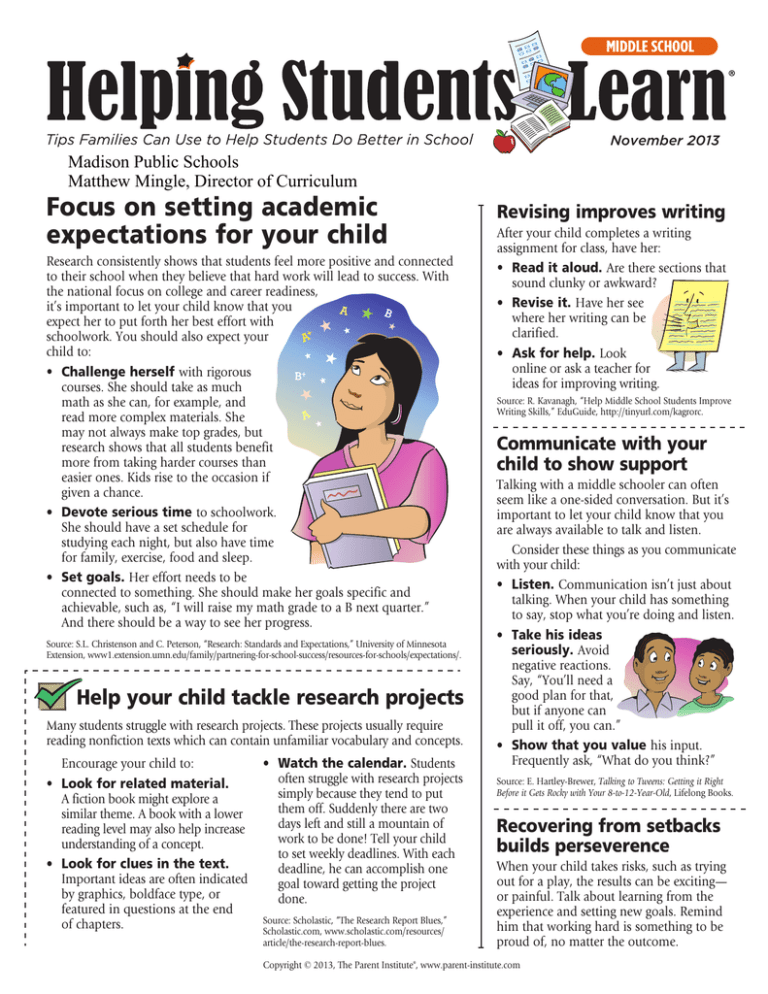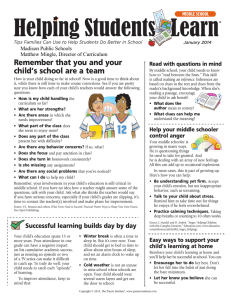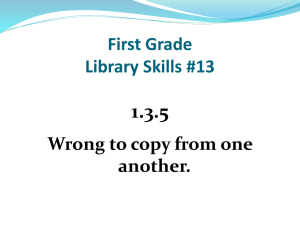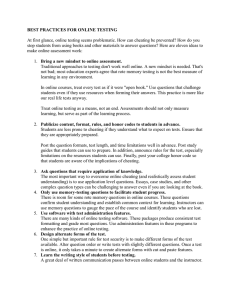Focus on setting academic expectations for your child Revising improves writing
advertisement

November 2013 Madison Public Schools Matthew Mingle, Director of Curriculum Focus on setting academic expectations for your child Research consistently shows that students feel more positive and connected to their school when they believe that hard work will lead to success. With the national focus on college and career readiness, it’s important to let your child know that you expect her to put forth her best effort with schoolwork. You should also expect your child to: • Challenge herself with rigorous courses. She should take as much math as she can, for example, and read more complex materials. She may not always make top grades, but research shows that all students benefit more from taking harder courses than easier ones. Kids rise to the occasion if given a chance. • Devote serious time to schoolwork. She should have a set schedule for studying each night, but also have time for family, exercise, food and sleep. • Set goals. Her effort needs to be connected to something. She should make her goals specific and achievable, such as, “I will raise my math grade to a B next quarter.” And there should be a way to see her progress. Source: S.L. Christenson and C. Peterson, “Research: Standards and Expectations,” University of Minnesota Extension, www1.extension.umn.edu/family/partnering-for-school-success/resources-for-schools/expectations/. Help your child tackle research projects Many students struggle with research projects. These projects usually require reading nonfiction texts which can contain unfamiliar vocabulary and concepts. Encourage your child to: • Look for related material. A fiction book might explore a similar theme. A book with a lower reading level may also help increase understanding of a concept. • Look for clues in the text. Important ideas are often indicated by graphics, boldface type, or featured in questions at the end of chapters. • Watch the calendar. Students often struggle with research projects simply because they tend to put them off. Suddenly there are two days left and still a mountain of work to be done! Tell your child to set weekly deadlines. With each deadline, he can accomplish one goal toward getting the project done. Source: Scholastic, “The Research Report Blues,” Scholastic.com, www.scholastic.com/resources/ article/the-research-report-blues. Revising improves writing After your child completes a writing assignment for class, have her: • Read it aloud. Are there sections that sound clunky or awkward? • Revise it. Have her see where her writing can be clarified. • Ask for help. Look online or ask a teacher for ideas for improving writing. Source: R. Kavanagh, “Help Middle School Students Improve Writing Skills,” EduGuide, http://tinyurl.com/kagrorc. Communicate with your child to show support Talking with a middle schooler can often seem like a one-sided conversation. But it’s important to let your child know that you are always available to talk and listen. Consider these things as you communicate with your child: • Listen. Communication isn’t just about talking. When your child has something to say, stop what you’re doing and listen. • Take his ideas seriously. Avoid negative reactions. Say, “You’ll need a good plan for that, but if anyone can pull it off, you can.” • Show that you value his input. Frequently ask, “What do you think?” Source: E. Hartley-Brewer, Talking to Tweens: Getting it Right Before it Gets Rocky with Your 8-to-12-Year-Old, Lifelong Books. Recovering from setbacks builds perseverence When your child takes risks, such as trying out for a play, the results can be exciting— or painful. Talk about learning from the experience and setting new goals. Remind him that working hard is something to be proud of, no matter the outcome. Copyright © 2013, The Parent Institute®, www.parent-institute.com Be clear about cheating November 2013 How can I boost my middle schooler’s self-esteem? Q: My child used to be so confident, but recently he’s been saying that he doesn’t fit in or that he’s so “weird.” How can I help him feel good about himself again? A: Middle school is a time of enormous change and growth for kids, and your child is starting to become his own person. As long as he isn’t socially isolated, struggling with schoolwork or being bullied, there’s nothing wrong with letting him blossom into his own quirky, unique person. To support him along the way: • Respect his views. You don’t have to agree with your child’s opinions, but don’t belittle them, either. • Be tolerant of his individuality. His choice of clothing, hairstyle or entertainment may not be to your taste, but as long as it isn’t inappropriate or offensive, let him enjoy what he likes. • Spend time together. Do something you both enjoy. But don’t expect him to like a certain activity just because you do—or because he did when he was younger. • Talk about learning from mistakes. Everyone stumbles occasionally, and that includes your child. Remind him that missteps aren’t horrible or the end of the world. They can be chances for growth. Is your child learning about responsibility? Take this quiz to see if you are encouraging your child to take more responsibility. This is necessary for success in middle school. Answer yes for something you do often or no for something you do rarely or never. ___1. Do you expect your child to care for personal needs, including getting herself up for school? ___2. Do you give your child chores to do at home, such as taking out the trash? ___3. Does your child know she must do her homework on her own? ___4. Do you expect your child to take advantage of opportunities to improve her work, such as by staying after school for extra help? ___5. Do you help your child use basic time-management tools, like an assignment notebook and a calendar? How did you do? Mostly yes answers mean you are fostering responsibility in your child. Mostly no? Check the quiz for some suggestions on helping your child take on responsibility. id to afra e ly r sual ho a u w n s on ent dow ead oot }Par r f t r i o the wh put ren rb d l i rove h c e ese P n v i a h h —C s.~ r toe i e h t The research on cheating is sobering. Cheating: • Has risen dramatically in the past 50 years. • Occurs with above-average students as well as lower-achieving peers. • D oesn’t carry much of a stigma anymore. • Isn’t “okay” because “everyone does it.” • Is easier than ever because of technology. Let your child know you expect honesty at all times, whether she’s at home or in class. Source: “Cheating is a Personal Foul: Academic Cheating Fact Sheet,” Educational Testing Service/Ad Council, http://tinyurl. com/5smux. Your child can take control of where to do homework When it comes to homework, middle schoolers often like to work somewhere besides home— especially if their friends are around. To make sure your child is completing his work: • Have a trial period where your child can do his homework when and where he chooses. • Check on your child’s achievement. If he’s doing well, continue to honor his preferences for where he completes his homework. Source: Source: C. Jarrett, “A preliminary psychology of homework,” BPS Research Digest, http://tinyurl.com/4rr6u3b. Tackle tests with positive thoughts and preparation The big exam is approaching and your child has a case of test anxiety. Encourage her to: • Dismiss “I can’t do this” thoughts. Positive self-talk can lead to positive results. • Avoid cramming. Regular study sessions leading up to an exam are much more helpful than frantic cramming. • Keep things in perspective. No single test will make or break her future. Helping Students Learn® Published in English and Spanish, September through May. Publisher: John H. Wherry, Ed.D. Editor: Stacey Marin. Staff Editors: Rebecca Miyares & Erika Beasley. Writer: Erika Beasley. Production Manager: Pat Carter. Translations Editor: Victoria Gaviola. Layout & Illustrations: Maher & Mignella, Cherry Hill, NJ. Copyright © 2013, The Parent Institute®, a division of NIS, Inc. P.O. Box 7474, Fairfax Station, VA 22039-7474 1-800-756-5525 • www.parent-institute.com • ISSN 1526-9272 1527-1021 Copyright © 2013, The Parent Institute®, www.parent-institute.com X02688343




